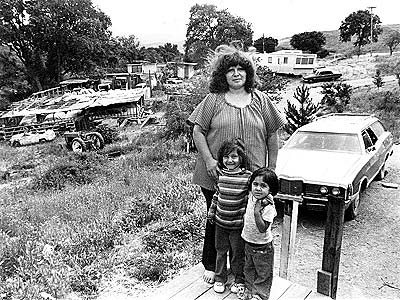By Petula Dvorak
"Poverty trumps mistreatment, absolutely," said Sheryl Brissett-Chapman, executive director of the National Center for Children and Families in Bethesda.
She explained that being extremely poor grinds down a child, that poverty gets into the brain and under the skin. Literally, actually.
Studies show that increased levels of cortisol, a chemical produced in the body as a result of stress, can seriously affect a child's brain development, stunting memory and disrupting learning patterns.
The stress of living in poverty gnaws at children. Poor kids who took part in one study were found to have elevated levels of cortisol in the morning. When the children showed up at a high-quality, small-group day-care center, where they bonded well with their teacher, the cortisol levels dropped. By afternoon, they were similar to the morning levels of their middle-class counterparts.
So, essentially, being poor costs a kid at least half a day in the classroom just to get the brain back to normal.
For more on the subject, see Intergenerational Trauma = PTSD and Only Whites Blame "Intergenerational Trauma"?


3 comments:
I think there are different definitions of poverty from all sides in America. I grew up in the midwest thinking my family was poor because a large part of the stigma was social settings and prejudices not only coming from non-natives, but from other natives that were more affluent and had "everything".
The 2006 documentary film, "God Grew Tired Of Us" is about the "lost boys of Sudan" that escaped their homelands due to poverty brought on by war.
Bear with me here, there is a point!
The main goal and motivation for the most poverty stricken children in this violent African scenario was getting an "education".
Although I was not raised on a reservation or might not be considered by many natives, poor, I grew up without running water and used an outhouse, but as Indian people, we were still met with a racist public school system and a limited opportunity to employment or career.
What angers and confuses me about many natives across the nation is that, yes, we have more hurdles and burdens to bear in a dominant society, but joining gangs and being alcoholics only forfills the whitemans stereotype of being American Indian, thus, we lose not only our culture and identity, but we destroy ourselves in the process.
I have nephews in their late teens and early twenties that can't even take out the trash muchless get a job or go to school.
Although our people still struggle in areas of health with diabetes and alcoholism, infant mortality and domestic violence, these are problems that we must fix within, not without.
Todays younger generation defines poverty as not having the most expensive clothes and weekly allowances, not as actual child hunger, which is here and in some African refugee camps. Poverty is universal and across the board, not just natives, and it is what we do with our poverty to succeed, as the lost boys of Sudan have proven, that changes our lives and our communities as well.
Meanwhile, many young natives in America today simply do not have the strength, will or foresight to WANT to finish high school, or help put food on the table.
They become young unemployed fathers, gangbangers or end up in prison, THEN, they begin to make plans to change their lives and have a real definition of what poverty is.
For more on the subject, see:
http://www.nytimes.com/2010/10/03/opinion/03kristof.html
At Risk From the Womb
Perhaps the most striking finding is that a stressful uterine environment may be a mechanism that allows poverty to replicate itself generation after generation. Pregnant women in low-income areas tend to be more exposed to anxiety, depression, chemicals and toxins from car exhaust to pesticides, and they’re more likely to drink or smoke and less likely to take vitamin supplements, eat healthy food and get meticulous pre-natal care.
The result is children who start life at a disadvantage—for kids facing stresses before birth appear to have lower educational attainment, lower incomes and worse health throughout their lives. If that’s true, then even early childhood education may be a bit late as a way to break the cycles of poverty.
And more:
Study: Poverty kills people
Post a Comment